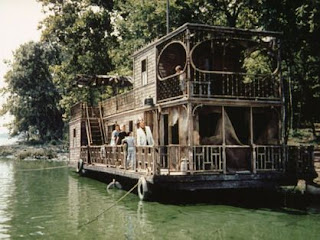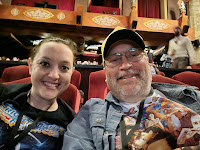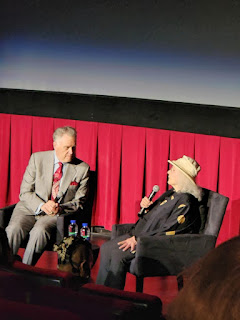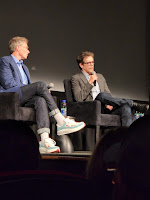Tuesday, May 31, 2022
Top Gun Maverick
Tuesday, May 24, 2022
Star Trek The Motion Picture (4K Director's Cut)
effects shots and additional scenes to tantalize us. I owned that edition on VHS and on Laser Disc, as well as a Laser Disc version of the original theatrical cut. I suppose it was my purchase of a collection of Star Trek films from the first to the fifth in a Laserdisc Box set that made me complacent about updating the films when they had subsequent releases.
I have never seen the Director's Cut by Robert Wise from the 2001 DVD offering. I bypassed it, figuring ist was simply a remaster of the Special Edition. It was not until I saw the film last night that I saw what substantial improvements in the story had been made by the inclusion of two previously cut scenes and the trimming of other moments here and there. This 4K version is a remastering of the Director's Cut from 2001 and of course it is digitally enhanced to improve the video and the audio.
"The human adventure is just beginning."
Friday, May 20, 2022
Men
Thursday, May 5, 2022
Doctor Strange in the Multiverse of Madness
Tuesday, May 3, 2022
The Unbearable Weight of Massive Talent
TCM Film Festival Day Four
It's always a bit sad when you reach the last day of the festival. Even though you might have a full slate of events to attend, the knowledge that it is all coming to an end sometimes hangs over you. That's one reason to start the day off with something that you know is going to get you going on the right foot. I'd watched "Paper Moon" just a couple of months ago, when Director Peter Bogdanovich had passed away. My film salute that weekend also included "The Last Picture Show". It was just five years ago that he attended the festival to talk about "What's Up Doc?", the second of a trio of films that had made him the hottest director in Hollywood. "Paper Moon" was the third film in this string of hits and it won nine year old Tatum O'Neal the Academy Award for Best Supporting Actress.
"Paper Moon" is a terrific film that is hugely entertaining, and it had the bonus of being a film my daughter had yet to see. It is my pleasure to have introduced it to her and to say that it was her favorite film of the festival, what a great surprise and joy. TCM Host Ben Mankiewicz interviewed Louise Stratten about Bogdanovich and his career. She was his former wife, longtime collaborator and friend to the end of his life. She is also the sister of the late Dorothy Stratten, who Bogdanovich fell in love with before she was murdered by her husband.
She spoke very highly of Bogdanovich and is trying to carry on his legacy with some film projects. Ben had recently spent a great deal of time talking with the director for the TCM Podcast
"The Plot Thickens". It is worth your time to listen, especially if you are a lover of older films.
After our first film of the day, we zipped upstairs to get inline for "Fly by Night", a comic thriller that I had never heard of before. Alas, we had a high queue number and it did not look promising for us to get in. We went over to the adjacent line to get a queue number for "High Noon" as a backup. Sure enough, with about seven people in front of us, we were informed that "Fly by Night" was full, so we zipped over and got seats in the back for the Gary Cooper Classic Western.
So maybe it wasn't our first choice, after all we have both seen it numerous times before, but it certainly deserves a showcase at the festival. We were Ok with the substitute and then we got something we did not expect and which was one of the highlights of the festival for us. Country Music star Marty Stuart was doing the introduction and he was fantastic. He expressed all the themes that the film was about and talked about how engaging the music was. He got so wrapped up in the energy of the tune that is the theme, he practically played it out by slapping his chest, like Matthew McConaughey in the "The Wolf of Wall Street".Of all the introductions of films at the festival, his was the most moving and generous and I felt really lucky to have been locked out of the other film. In addition to Mr. Stuart, we were introduced to Gary Cooper's daughter Maria Cooper Janis who had some stories of her own to tell about the film and her father.
 |
| Tony Bill, David Ward, Michael Phillips along with Ben Mankiewicz |
They talked about the casting issues and adapting the book to a workable screenplay. One story that they mentioned was that Robert Shaw's limp in the film was a result of an accident he had and instead of recasting the part, it simply became part of the character. Shaw got the part because the originally cast Richard Boone, mercurially vanished after being offered the part and no one knew how to get a hold of him.
Friday, April 29, 2022
TCM Film Festival Day Three
Saturday at the film festival would be our busiest day this year. First in the lineup was the Cary Grant Sophia Loren comedy, "Houseboat". I have a vague recollection of seeing this on TV as a kid, but in truth, I don't remember it at all. I'm not sure if Amanda had seen a Sophia Loren film, but she is a Cary Grant fan and this was playing in the big house so it seemed to be a good way to start the day. The host told stories about the affair that Grant and Loren had had on their previous picture together and how this film was made at an awkward time in their relationship as Grant was willing to leave his wife and marry Loren, and she fell in love with and married another man. The child actors were cute but a little wooden, and the slapstick elements sometimes overshadow whatever story there is here.
Mr. Gebert also appeared in the classic "Holiday Affair" with Robert Mitchum. He pointed out a few places where the magic of Hollywood placed him in peril, when he was actually quite safe. He also did a little retconning of a brief smile that appears on his face in the film, suggesting that he was actually plotting his capture the whole time thus the smile is not incongruent.
"A Man Called Adam" is a film I never heard of before and it was something of a box office success, but it is understandable how it might get lost in the years since it was released. It is a film with a civil rights theme, that was overshadowed in subsequent years for bigger hits that milked the same territory. With rapid changes in race relations over the next couple of decades, a film that was not an Academy Award winner, and did not feature the star power of Spenser Tracy, Sidney Pointier, Katharine Hepburn or Rod Steiger, could be misplaced.
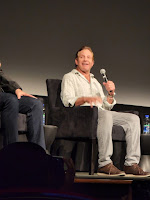 I know that Steve Guttenberg has been the subject of derision in the past few years, as a result of a stunt where he appeared naked in Central Park. It looks though as if he is the best preserved of the group and he has retained a youthful exuberance that came across on the program. Although he steered off course several times, he was well aware of it and usually returned to the question Karger was asking, but he always wanted to get in an extra comment or piece of information and they were all welcome.
I know that Steve Guttenberg has been the subject of derision in the past few years, as a result of a stunt where he appeared naked in Central Park. It looks though as if he is the best preserved of the group and he has retained a youthful exuberance that came across on the program. Although he steered off course several times, he was well aware of it and usually returned to the question Karger was asking, but he always wanted to get in an extra comment or piece of information and they were all welcome. 
.jpg)


.jpg)










